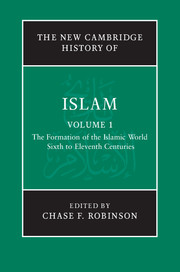42 results
Slavery in the Conquest Period
-
- Journal:
- International Journal of Middle East Studies / Volume 49 / Issue 1 / February 2017
- Published online by Cambridge University Press:
- 20 January 2017, pp. 158-163
- Print publication:
- February 2017
-
- Article
-
- You have access
- HTML
- Export citation

The New Cambridge History of Islam
-
- Published online:
- 28 March 2011
- Print publication:
- 04 November 2010
PART I - THE LATE ANTIQUE CONTEXT
-
- Book:
- The New Cambridge History of Islam
- Published online:
- 28 March 2011
- Print publication:
- 04 November 2010, pp -
-
- Chapter
- Export citation
PART II - UNIVERSALISM AND IMPERIALISM
-
- Book:
- The New Cambridge History of Islam
- Published online:
- 28 March 2011
- Print publication:
- 04 November 2010, pp -
-
- Chapter
- Export citation
Frontmatter
-
- Book:
- The New Cambridge History of Islam
- Published online:
- 28 March 2011
- Print publication:
- 04 November 2010, pp i-xxxviii
-
- Chapter
- Export citation
Bibliography
-
- Book:
- The New Cambridge History of Islam
- Published online:
- 28 March 2011
- Print publication:
- 04 November 2010, pp 699-783
-
- Chapter
- Export citation
Glossary
-
- Book:
- The New Cambridge History of Islam
- Published online:
- 28 March 2011
- Print publication:
- 04 November 2010, pp 696-698
-
- Chapter
- Export citation
PART III - REGIONALISM
-
- Book:
- The New Cambridge History of Islam
- Published online:
- 28 March 2011
- Print publication:
- 04 November 2010, pp -
-
- Chapter
- Export citation
PART IV - THE HISTORIOGRAPHY OF EARLY ISLAMIC HISTORY
-
- Book:
- The New Cambridge History of Islam
- Published online:
- 28 March 2011
- Print publication:
- 04 November 2010, pp -
-
- Chapter
- Export citation
Index
-
- Book:
- The New Cambridge History of Islam
- Published online:
- 28 March 2011
- Print publication:
- 04 November 2010, pp 784-851
-
- Chapter
- Export citation
Plate Section
-
- Book:
- The New Cambridge History of Islam
- Published online:
- 28 March 2011
- Print publication:
- 04 November 2010, pp -
-
- Chapter
- Export citation
Contributors
-
-
- Book:
- The Cambridge Dictionary of Christianity
- Published online:
- 05 August 2012
- Print publication:
- 20 September 2010, pp xi-xliv
-
- Chapter
- Export citation
15 - The Violence of the Abbasid Revolution
-
-
- Book:
- Living Islamic History
- Published by:
- Edinburgh University Press
- Published online:
- 12 September 2012
- Print publication:
- 21 April 2010, pp 226-251
-
- Chapter
- Export citation
Patricia Crone, From Kavād to Ghazālī: Religion, Law and Political Thought in the Near East, c. 600–c. 1100, Variorum Collected Studies Series (Aldershot, U.K.: Ashgate, 2005). Pp. 366. $124.95 cloth.
-
- Journal:
- International Journal of Middle East Studies / Volume 40 / Issue 3 / August 2008
- Published online by Cambridge University Press:
- 01 August 2008, pp. 512-513
- Print publication:
- August 2008
-
- Article
- Export citation
The conquest of Khu¯zista¯n: a historiographical reassessment
-
- Journal:
- Bulletin of the School of Oriental and African Studies / Volume 67 / Issue 1 / February 2004
- Published online by Cambridge University Press:
- 21 April 2004, pp. 14-39
- Print publication:
- February 2004
-
- Article
- Export citation
White Banners: Contention in ʿAbbasid Syria, 750–880. By Paul M. Cobb. pp. xx, 228. State University of New York Press, Albany, 2001.
-
- Journal:
- Journal of the Royal Asiatic Society / Volume 12 / Issue 2 / July 2002
- Published online by Cambridge University Press:
- 12 July 2002, pp. 195-196
- Print publication:
- July 2002
-
- Article
- Export citation
Contents
-
- Book:
- Empire and Elites after the Muslim Conquest
- Published online:
- 13 August 2009
- Print publication:
- 21 December 2000, pp vii-vii
-
- Chapter
- Export citation
Map: The Fertile Crescent in the early Abbasid period
-
- Book:
- Empire and Elites after the Muslim Conquest
- Published online:
- 13 August 2009
- Print publication:
- 21 December 2000, pp xvi-xvi
-
- Chapter
- Export citation
Frontmatter
-
- Book:
- Empire and Elites after the Muslim Conquest
- Published online:
- 13 August 2009
- Print publication:
- 21 December 2000, pp i-vi
-
- Chapter
- Export citation
3 - From garrison to city: the birth of Mosul
-
- Book:
- Empire and Elites after the Muslim Conquest
- Published online:
- 13 August 2009
- Print publication:
- 21 December 2000, pp 63-89
-
- Chapter
- Export citation



